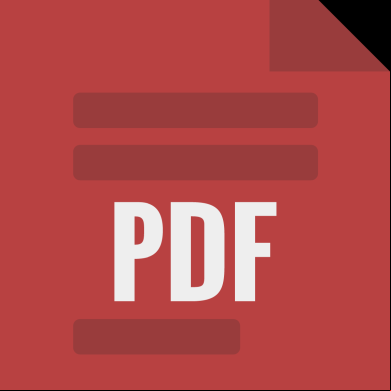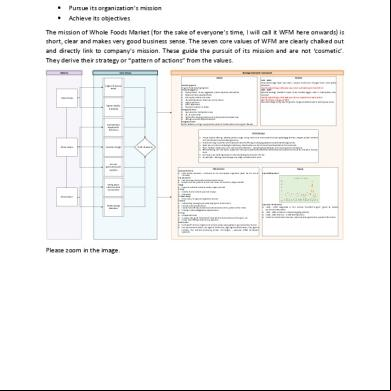Ch01 5th Ed Narayanaswamy Financial ing 4o4c6w
This document was ed by and they confirmed that they have the permission to share it. If you are author or own the copyright of this book, please report to us by using this report form. Report 3b7i
Overview 3e4r5l
& View Ch01 5th Ed Narayanaswamy Financial ing as PDF for free.
More details w3441
- Words: 682
- Pages: 20
Financial ing: A Managerial Perspective Fifth Edition Prepared by R. Narayanaswamy Indian Institute of Management Bangalore
1 April 2014
© PHI Learning Private Limited New Delhi
1
Chapter 1 ing, Markets, and Governance
1 April 2014
© PHI Learning Private Limited New Delhi
2
Understanding Business Organizations
1 April 2014
Merchandising organizations Manufacturing organizations Service organizations Business organizations as cash generating-cum-dispensing machines
© PHI Learning Private Limited New Delhi
3
Business Organizations
1 April 2014
© PHI Learning Private Limited New Delhi
4
What is ing
1 April 2014
ing is the language of business Who should know ing? Why ing in MBA? The MBA Oath and financial reporting ing information and economic decisions © PHI Learning Private Limited New Delhi
5
The ing Information System
1 April 2014
© PHI Learning Private Limited New Delhi
6
s of ing Information 1 April 2014
Investors Lenders Analysts and advisers Managers Employees and trade unions Suppliers and trade financiers Customers Government and regulatory authorities The public © PHI Learning Private Limited New Delhi
7
Financial ing and Management ing
1 April 2014
Financial ing Management ing How do they differ?
© PHI Learning Private Limited New Delhi
8
ing Measurement Assumptions
Reporting entity Going concern
1 April 2014
Historical cost
Periodicity Money measurement
© PHI Learning Private Limited New Delhi
9
Generally Accepted ing Principles and the ing Environment
1 April 2014
© PHI Learning Private Limited New Delhi
10
Generally Accepted ing Principles and the ing Environment
ing standards and policies
Converging IGAAP with IFRS
1 April 2014
ing standards ing standard-setting arrangements ing policies IGAAP IFRS Ind AS
Principles or rules? © PHI Learning Private Limited New Delhi
11
Forms of Business Organization
Sole proprietorship Partnership Limited company
1 April 2014
Listed Public Private
Limited liability partnership Legal formalities for a limited company © PHI Learning Private Limited New Delhi
12
The Corporate Organization
1 April 2014
© PHI Learning Private Limited New Delhi
13
ing, Capital Market and Corporate Governance
1 April 2014
The lemons principle and the problem of adverse selection Signalling quality Moral hazard and corporate governance
© PHI Learning Private Limited New Delhi
14
The ing Equation
1 April 2014
Economic resources = Claims Assets = Liabilities + Equity Assets: “own” Liabilities: “owe” Equity: “residual interest” Analyzing the effect of transactions
© PHI Learning Private Limited New Delhi
15
Financial Statements
1 April 2014
Statement of profit and loss Statement of retained earnings Balance sheet Cash flow statement Statement of retained earnings How are the financial statements interrelated? Preview of financial statement analysis © PHI Learning Private Limited New Delhi
16
What do ants Do?
Public ing
Private ing
1 April 2014
Auditing Forensic ing and risk management Tax services Advisory services Bankruptcy Small business services Management ing Internal auditing Information systems
Government ing Not-for-profit ing © PHI Learning Private Limited New Delhi
17
ing as an Academic Discipline
Illustrative research areas
1 April 2014
ing and stock prices Benefits of disclosure Usefulness of accrual and cash Reporting losses faster than gains Selection of ing methods and disclosure levels Predicting future profits from past profits Disclosure and managerial behaviour Executive pay and financial performance © PHI Learning Private Limited New Delhi
18
Fraud and Ethical Issues in ing
What leads to fraud and unethical ing? Fraud-hit companies: e.g.
1 April 2014
Satyam Enron WorldCom
The Satyam case Resolving ethical dilemmas Whistle-blowing © PHI Learning Private Limited New Delhi
19
End of Chapter 1 ing, Markets, and Governance
1 April 2014
© PHI Learning Private Limited New Delhi
20
1 April 2014
© PHI Learning Private Limited New Delhi
1
Chapter 1 ing, Markets, and Governance
1 April 2014
© PHI Learning Private Limited New Delhi
2
Understanding Business Organizations
1 April 2014
Merchandising organizations Manufacturing organizations Service organizations Business organizations as cash generating-cum-dispensing machines
© PHI Learning Private Limited New Delhi
3
Business Organizations
1 April 2014
© PHI Learning Private Limited New Delhi
4
What is ing
1 April 2014
ing is the language of business Who should know ing? Why ing in MBA? The MBA Oath and financial reporting ing information and economic decisions © PHI Learning Private Limited New Delhi
5
The ing Information System
1 April 2014
© PHI Learning Private Limited New Delhi
6
s of ing Information 1 April 2014
Investors Lenders Analysts and advisers Managers Employees and trade unions Suppliers and trade financiers Customers Government and regulatory authorities The public © PHI Learning Private Limited New Delhi
7
Financial ing and Management ing
1 April 2014
Financial ing Management ing How do they differ?
© PHI Learning Private Limited New Delhi
8
ing Measurement Assumptions
Reporting entity Going concern
1 April 2014
Historical cost
Periodicity Money measurement
© PHI Learning Private Limited New Delhi
9
Generally Accepted ing Principles and the ing Environment
1 April 2014
© PHI Learning Private Limited New Delhi
10
Generally Accepted ing Principles and the ing Environment
ing standards and policies
Converging IGAAP with IFRS
1 April 2014
ing standards ing standard-setting arrangements ing policies IGAAP IFRS Ind AS
Principles or rules? © PHI Learning Private Limited New Delhi
11
Forms of Business Organization
Sole proprietorship Partnership Limited company
1 April 2014
Listed Public Private
Limited liability partnership Legal formalities for a limited company © PHI Learning Private Limited New Delhi
12
The Corporate Organization
1 April 2014
© PHI Learning Private Limited New Delhi
13
ing, Capital Market and Corporate Governance
1 April 2014
The lemons principle and the problem of adverse selection Signalling quality Moral hazard and corporate governance
© PHI Learning Private Limited New Delhi
14
The ing Equation
1 April 2014
Economic resources = Claims Assets = Liabilities + Equity Assets: “own” Liabilities: “owe” Equity: “residual interest” Analyzing the effect of transactions
© PHI Learning Private Limited New Delhi
15
Financial Statements
1 April 2014
Statement of profit and loss Statement of retained earnings Balance sheet Cash flow statement Statement of retained earnings How are the financial statements interrelated? Preview of financial statement analysis © PHI Learning Private Limited New Delhi
16
What do ants Do?
Public ing
Private ing
1 April 2014
Auditing Forensic ing and risk management Tax services Advisory services Bankruptcy Small business services Management ing Internal auditing Information systems
Government ing Not-for-profit ing © PHI Learning Private Limited New Delhi
17
ing as an Academic Discipline
Illustrative research areas
1 April 2014
ing and stock prices Benefits of disclosure Usefulness of accrual and cash Reporting losses faster than gains Selection of ing methods and disclosure levels Predicting future profits from past profits Disclosure and managerial behaviour Executive pay and financial performance © PHI Learning Private Limited New Delhi
18
Fraud and Ethical Issues in ing
What leads to fraud and unethical ing? Fraud-hit companies: e.g.
1 April 2014
Satyam Enron WorldCom
The Satyam case Resolving ethical dilemmas Whistle-blowing © PHI Learning Private Limited New Delhi
19
End of Chapter 1 ing, Markets, and Governance
1 April 2014
© PHI Learning Private Limited New Delhi
20










